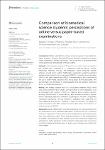Comparison of biomedical science students’ perceptions of online versus paper-based examinations
| dc.contributor.author | Winters, E | |
| dc.contributor.author | Mitchell, W | |
| dc.contributor.author | Jeremy, K | |
| dc.contributor.author | Subhan, M | |
| dc.date.accessioned | 2024-01-08T15:02:40Z | |
| dc.date.available | 2024-01-08T15:02:40Z | |
| dc.date.issued | 2024-01-08 | |
| dc.identifier.issn | 2504-284X | |
| dc.identifier.issn | 2504-284X | |
| dc.identifier.other | ARTN 1321206 | |
| dc.identifier.uri | https://pearl.plymouth.ac.uk/handle/10026.1/21883 | |
| dc.description.abstract |
Introduction: Online examinations are becoming increasingly incorporated into higher education. However, Biomedical Science students’ perspectives on exam format preferences remains unexplored. This study aims to investigate exam format preferences and attitudes of these students. Methods: A self-reported survey of 31 questions on online exam perceptions was utilized and composed of six dimensions: affective factors, validity, practicality, reliability, security, and pedagogy. Scores measured student attitudes around online exams. Additionally, categorical questions examined attitudes around open-book online exams (OBOEs), closed-book online exams (CBOEs), and paper-based exams (PBEs). Qualitative analysis was conducted via the use of open-ended questions and a focus group on five participants. The questionnaire was distributed to undergraduates and 146 students responded across six different programmes. Results: The findings revealed that 57.5% of students preferred OBOEs while only 19.9% preferred PBEs. OBOEs were perceived as more favorable in all six dimensions and superior in terms of reducing stress, ensuring fairness, allowing demonstration of understanding, and retaining information. Gender had no statistically significant influence on perception. However, programme statistically significantly affected responses. Qualitative data supported the main statistical analysis and identified a trade-off between the ability to retain information with PBEs, despite the stress and better demonstration of understanding with OBOEs. Discussion: Overall, OBOEs were viewed positively and were well accepted; they are anticipated to be a dominant examination format at the UoP. Institutions wishing to implement online exams should consider the perceived benefits they have over traditional exams. These findings contribute to the understanding of students’ perceptions of exam formats, which can inform their design and application in higher education. Further research should explore the perceptions of other disciplines and identify ways to address any challenges associated with online exams. | |
| dc.format.extent | 1321206- | |
| dc.publisher | Frontiers Media | |
| dc.subject | biomedical science | |
| dc.subject | examinations | |
| dc.subject | focus group | |
| dc.subject | questionnaire | |
| dc.subject | assessment | |
| dc.subject | online exams | |
| dc.subject | paper-based exams | |
| dc.title | Comparison of biomedical science students’ perceptions of online versus paper-based examinations | |
| dc.type | journal-article | |
| dc.type | Article | |
| plymouth.volume | 8 | |
| plymouth.publication-status | Published online | |
| plymouth.journal | Frontiers in Education | |
| dc.identifier.doi | 10.3389/feduc.2023.1321206 | |
| plymouth.organisational-group | |Plymouth | |
| plymouth.organisational-group | |Plymouth|Faculty of Health | |
| plymouth.organisational-group | |Plymouth|Users by role | |
| plymouth.organisational-group | |Plymouth|Users by role|Academics | |
| plymouth.organisational-group | |Plymouth|Faculty of Health|School of Biomedical Sciences | |
| dcterms.dateAccepted | 2023-12-08 | |
| dc.date.updated | 2024-01-08T15:02:40Z | |
| dc.rights.embargodate | 2024-1-10 | |
| dc.identifier.eissn | 2504-284X | |
| rioxxterms.versionofrecord | 10.3389/feduc.2023.1321206 |


